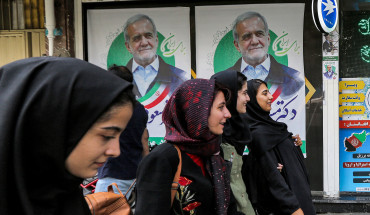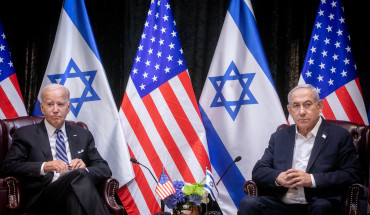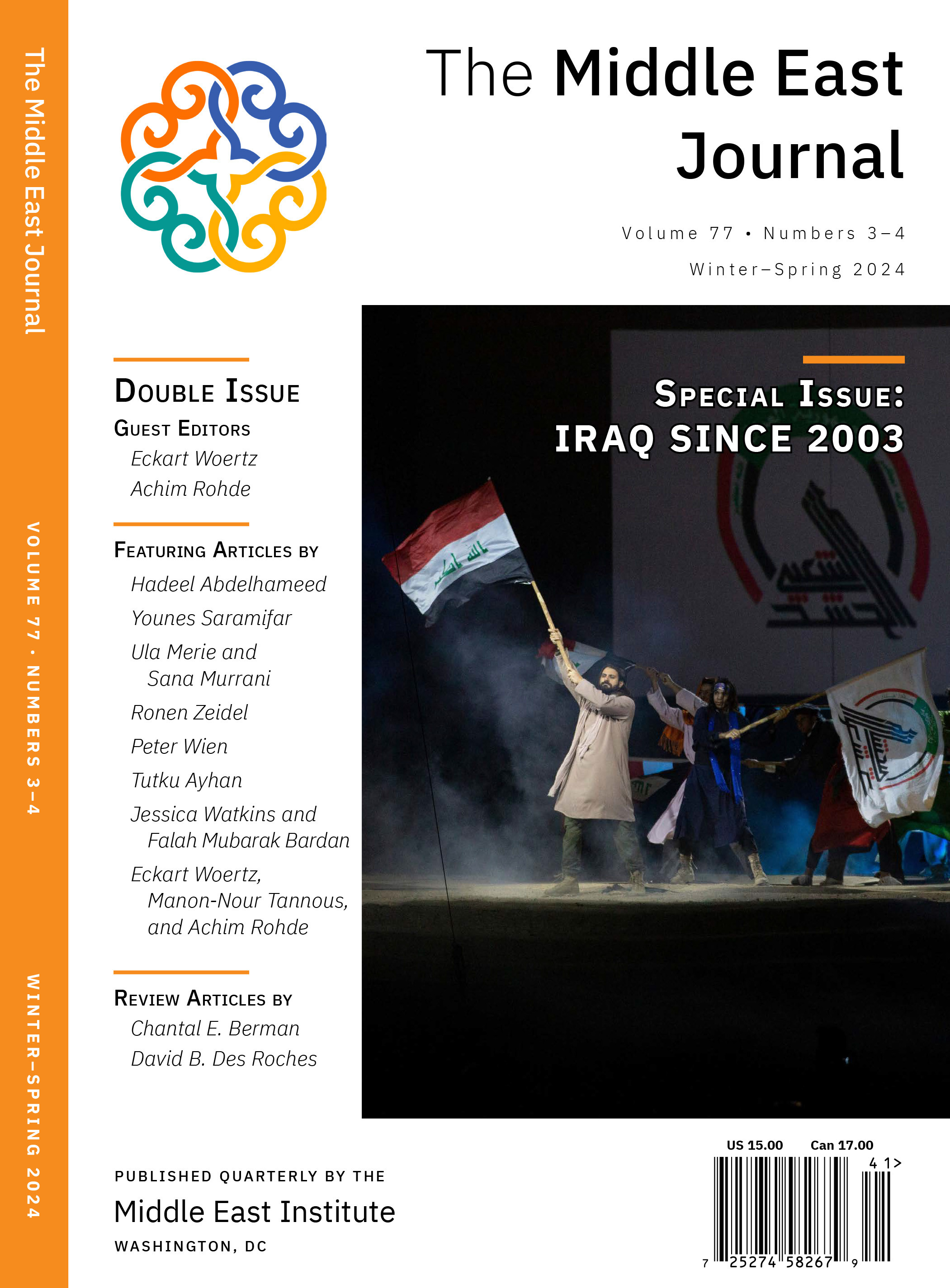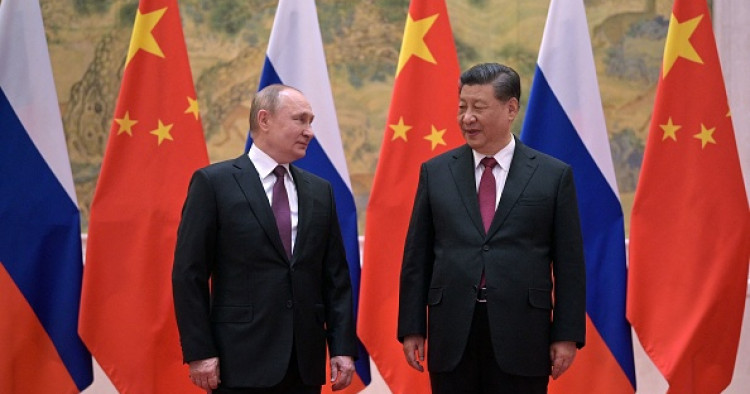This piece is part of the series “All About China”—a journey into the history and diverse culture of China through short articles that shed light on the lasting imprint of China’s past encounters with the Islamic world as well as an exploration of the increasingly vibrant and complex dynamics of contemporary Sino-Middle Eastern relations. Read more ...
Beijing’s response to Russia’s war against Ukraine has profound implications for the US-China bilateral relationship. The choices Xi Jinping makes, notably whether to provide material assistance to Russia economically or militarily, is likely to determine whether a new Cold War can be averted. The stakes for the countries of the Middle East and North Africa (MENA) could not be higher, as until now they have sought to diversify their extra-regional partnerships rather than choose sides.
Putin’s “Gift”
Xi Jinping and Vladimir Putin, having met 38 times as national leaders, are reportedly the best of friends.[1] For Xi’s 66th birthday, Putin presented him[2] with a giant box of his favorite Russian ice cream.[3] But Putin’s war against Ukraine is anything but a gift to Xi. On the contrary, the conflict poses uncomfortable choices for China, despite the recent deepening of Sino-Russian ties and the possible short-term strategic and economic gains to be had from the conflict.
2021 was a landmark year for Sino-Russian relations. The two sides renewed their 20-year treaty on friendship and cooperation, held large-scale joint military exercises,[4] and reached agreement to boost trade. The joint statement about a “new era” of international relations[5] that followed the meeting between Xi and Putin in early February of this year declared there were “no limits” or “forbidden areas” of cooperation — though without mentioning Ukraine.
However, the war in Ukraine has put the “no limits” China-Russia relationship to the test. For the time being, Russia’s war against Ukraine seems to have redounded to China’s advantage by having drawn American power and attention to Europe. The conflict also appears to have rendered Russia more reliant upon China, which could benefit from sanctions imposed on Russia by soaking up oil, gas, wheat, and minerals at discounted prices.
Nevertheless, Putin’s decision to invade Ukraine has proven to be a major strategic misjudgment and presented some unpleasant surprises for China.[6] Significantly for Beijing, the war has united the US and its allies to an extraordinary degree. NATO, which declared China a security concern in 2021,[7] has been reinvigorated. European governments have recommitted to increasing defense spending.[8] The G7 are coordinating severe economic and financial sanctions against Russia.[9] Not only are America’s Asia-Pacific allies engaged in the sanctions targeting Russia, but the conflict in Ukraine was a key topic of discussion at the most recent meeting of the Quad.[10] None of these developments serve the interests of the Chinese leadership. If anything, they vitiate Beijing’s claim and perhaps weaken its confidence that the West is in decline, risk-averse, divided, and incapable of coordinated action.
China’s Choices
How, then, has Beijing responded to Russia’s war against Ukraine and to the unwelcome surprises associated with it? For one thing, Chinese officials have categorically denied foreknowledge of the invasion.[11] For another, they have repeatedly declined to condemn Russia’s attack on Ukraine or to characterize it as an “invasion,” instead urging restraint by “all parties.”[12] They have labeled the United States “the culprit” for having backed Russia into a corner by expanding NATO to its borders,[13] scrubbed the country’s media of sympathetic coverage of Ukraine and allowed Russian propaganda to shape Chinese public perceptions about the war, and in some cases amplified it internationally, including in the Middle East.[14] Additionally, they have attempted to draw parallels between the US Indo-Pacific Strategy and the Atlantic Alliance’s “eastward expansion,” echoing Moscow’s talking points.[15]
Still, as the war has dragged on and the humanitarian crisis has worsened, the risk-reward balance for China has shifted. So, too, has Beijing’s posture — though only slightly. China’s abstention from the February 25 draft UN Security Council resolution condemning the invasion[16] raised some expectation that Beijing would distance itself from Moscow. Since then, Chinese officials have become clearly unsettled by the course that the war has taken, expressing that they are “deeply” worried about the “grave” situation in Ukraine.[17] Yet, China has continued to furnish diplomatic cover for Russia. Though acknowledging that Ukraine is facing a humanitarian catastrophe, the Chinese UN delegation has worked to ensure that the language of Security Council resolutions calling for aid access and civilian protection does not mention Russia as the initiator of the conflict.[18] Statements by Chinese officials welcoming any measure that can alleviate the humanitarian crisis ring hollow in the face of their pledges of aid to date, which amount to the paltry sum of 15 million yuan ($2.3 million).[19]
China’s pretense of neutrality has given way to the guise of assuming the role of “peacemaker.”[20] Indeed, Chinese officials have taken great pains to portray their approach as an “independent policy of peace.” This is not surprising. For Beijing to publicly endorse the invasion would be to undermine the foundational principles of its diplomacy[21] and risk damaging the country’s international reputation. Yet, even so, there is scant evidence that China’s offer to play a proactive mediatory role[22] is anything more than an empty gesture or that Beijjing is prepared to use its leverage to prod Moscow to negotiate in good faith, despite calls to do so by Ukraine,[23] the European Union (EU),[24] Singapore, and others. On the contrary, China has gone as far as to discourage multilateral efforts in international forums such as the International Court of Justice (ICJ) and Group of 20 (G20) to hold Russia to account.[25]
Foreign Minister Wang Yi’s six-point Ukraine peace initiative[26] is reminiscent of Beijing’s peace plans for Syria[27] and Israel/Palestine, the latter mooted in 2017 and repackaged four years later[28] — short on details and devoid of the concrete activities, including the hard work of shuttling between capitals, that might clear a pathway for de-escalation. Thus, while the war in Ukraine presents an opportunity for China to raise its diplomatic profile, there is little indication that Beijing is about to break the pattern formed by its mediation activities elsewhere, which have consisted mainly of high-visibility though limited and low-impact efforts geared toward conflict management rather than conflict resolution.[29] Furthermore, were China to seize the opportunity to lead a mediation effort from the position of ‘biased neutrality,’ whether it could “deliver [its] side,”[30] namely Russia, is unclear. To be fair, whether China has the expertise, capacity, self-confidence, or the understanding of Putin’s goals and how he intends to achieve them needed to help bring the war to an end is also unclear.
Threading the needle between nominally supporting an end to the war and preserving its strategic partnership with Russia is an especially vexing challenge for China when it comes to sanctions. Chinese officials have steadfastly maintained that sanctions imposed by the West against Russia are illegal and counter-productive.[31] Yet, China stands to lose by being viewed as an enabler if Beijing attempts to throw Russia an economic lifeline. Chinese banks and businesses would suffer more by being cut off from international markets and dollar-denominated transactions if they violate sanctions than they would gain from increased trade with Russia.[32]
The United States has put Beijing on notice that there would be consequences for evading export controls or processing its banned financial transactions.[33] European leaders, too, have stepped up their pressure on China to refrain from supporting Russia’s war effort.[34] Facing mounting Western pressure and a war of indeterminate duration, China has yet to lean decisively one way or the other on sanctions.
Bloomberg reported in late February that two of China’s largest banks — ICBC and Bank of China — had restricted financing for purchases of Russian commodities.[35] Reuters subsequently reported that China’s coal imports from Russia had stalled.[36] China declined to supply spare parts to Russian airlines when Airbus and Boeing blocked sales.[37] Though many foreign companies are exiting Russia, many Chinese firms appear to have adopted a wait-and-see approach.[38] Sinopec has paused talks regarding a major petrochemical investment in Russia.[39] The People’s Bank of China (PBOC) has yet to convert any of the roughly $90 billion worth of reserves Moscow holds in yuan into US dollars or euros.[40] And the Beijing-based Asian Infrastructure Investment Bank (AIIB) has suspended new lending to Russia.[41] The Shanghai-headquartered New Development Bank (NDB) (or “BRICS Bank”) has also put new transactions with Russia on hold.[42]
This restraint likely reflects a cold cost-benefit calculation of the risks posed by actively seeking to undermine economic and financial sanctions on Russia.[43] China’s economy is recovering from the impact of Covid-19 and may be facing a new wave of the pandemic, which prompted the brief lockdown of Chinese tech hub Shenzhen in mid-March, followed by the imposition of stringent restrictions on movement in Shanghai. The Chinese economy’s exposure to the fallout of the war, including rising food and energy prices and the potential for inflationary pressures, is considerable. Protracted tensions with the United States risk disrupting the trade and investment ties with Western economies that have been, and still are central to China’s economic success.
Some Chinese companies and services have no doubt provided relief to Russia. However, many others have tread more carefully. This seeming reluctance to rush to Russia’s side might explain the Biden administration’s apparent hesitancy to pull the secondary sanctions trigger on China. In the words of US Treasury Secretary Janet Yellen, sanctions against China are not (yet) “necessary or appropriate.”[44] According to National Security Adviser Jake Sullivan, the US is closely monitoring, but has not seen evidence of the provision of military equipment by China to Russia.[45]
But the reaction on Capitol Hill has been different. There, the Biden Administration’s efforts to enlist Chinese government support to isolate and punish Russia have been widely judged unsuccessful, producing a backlash in the form of a flurry of bills targeting China.[46] And therein lies the danger: Congressional overreaction offsetting whatever benefits might otherwise accrue from private but firm diplomacy by the US administration, China’s quiet compliance with sanctions, and perhaps a tacit arrangement between Washington and Beijing as to the acceptable limits of “normal” Sino-Russian economic interaction.
Mideast Dilemmas
The Russian invasion of Ukraine has reverberated around the world, with echoes of the Cold War warning of a perilous new era in international relations. The Middle East, only three decades removed from being a geopolitical battleground in the East-West struggle, is not immune from the spillover effects of the war in Ukraine.
As with China, whose core strategic priorities are re-incorporating Taiwan and establishing control over the country’s adjacent maritime environment, Middle Eastern states’ most pressing strategic concerns are those situated within their immediate neighborhood. Yet, although the war in Ukraine is a ‘distant conflict’ in which no MENA country is directly involved, all are exposed, to varying degrees, to its second-order effects. A protracted conflict threatens to further disrupt energy supplies, exacerbate food insecurity, and strain political relationships with Washington.
Russia has few close friends in the Middle East, and none of its relationships with MENA countries are of comparable value to its strategic partnership with China. But Moscow has nonetheless managed to build influence and leverage in the region in recent years. And that is largely why the US has found it difficult to line up MENA states behind a policy of isolating and punishing Russia. Since the conflict began, governments across the region have been wrestling with the challenge of how to reconcile competing interests. Their reluctance to side decisively against Russia reflects their respective security, energy, and trade interests whether in the form of policy convergence in regional conflict zones (Libya and Syria), cooperation in the context of OPEC+, or import dependence on agricultural commodities, primarily wheat. It also reflects the broader sentiment, in light of the chaotic US withdrawal from Afghanistan and the perceived failure to respond to Houthi attacks more forcefully, that Washington is unable or unwilling to honor its defense commitments.[47]
The UAE’s abstention on the February 25 US-drafted UN Security Council resolution condemning Russia’s action[48] and Saudi Arabia’s decision to maintain its oil output agreement with Russia[49] appeared to signal that Gulf leaders would avoid taking positions on the war. Just a week later, though, all six GCC states voted in favor of a UN General Assembly resolution demanding that Russia halt its invasion and withdraw its troops from Ukraine[50] — perhaps an indication that hedging their bets[51] might not be sustainable over the longer term. Yet, for the time being, Middle Eastern leaders have tempered their criticism of Moscow and politely rebuffed US requests to release more oil into the market.
As the conflict in Ukraine evolves and the Chinese and MENA governments calibrate their responses to it, we can see unfolding the contours of what the new era of multipolarity might look like. In the case of China, a Russia on the verge of becoming a pariah state with a collapsed economy is not the strategic partner that Xi likely envisioned or personally invested so much in cultivating. It appears that Beijing’s no-limits partnership with Russia does not compel it to support everything Moscow does. That said, Beijing’s quiet distancing from Moscow is unlikely to presage the dissolution of the Sino-Russian strategic partnership for the simple reason that even a badly damaged Russia can be an asset to China in standing against the West.
In the case of the MENA states, the evidence shows that none are in lockstep with the West’s approach or are prepared (any longer) to take their marching orders from Washington. Neither, however, are the traditional security partners of the United States among them ready to shed themselves of America’s protective shield, despite their eroding confidence in its reliability.
For the Biden administration, the Middle East has suddenly and unexpectedly become more important, and America’s traditional security partners more difficult to corral. The choices China makes in the weeks and months ahead, specifically with respect to sanctions compliance, will decide the future of major power relations and their implications for the Middle East. But equally important are the signals Washington sends and actions it takes to incentivize Beijing’s continued restraint. If Beijing and Washington were to misplay their hands, the secondary impacts of the war in Ukraine for MENA countries would likely mean they would have to face the threat of the extraterritorial application of US sanctions. This, in turn, would impose the impossible choices they have sought to avoid, causing US-MENA relations to further fray while raising the prospect of a region roiled not just by competing interests and agendas but by an overlay of heightened US-China strategic rivalry.
[1] Edward Wong and Julian E. Barnes, “Russia Asked China for Military and Economic Aid for Ukraine War, U.S. Officials Say,” New York Times, March 13, 2022, https://www.nytimes.com/2022/03/13/us/politics/russia-china-ukraine.html.
[2] “China’s Xi praises ‘best friend’ Putin during Russia visit,” BBC News, June 6, 2019, https://www.bbc.com/news/world-europe-48537663.
[3] Liu Zhen, “China-Russia ties turn icy in a sweet way as Vladimir Putin gifts Xi Jinping his favourite treat,” South China Morning Post, June 15, 2019, https://www.scmp.com/news/china/diplomacy/article/3014656/china-russia-ties-turn-icy-sweet-way-vladimir-putin-gifts-xi.
[4] “Iran, China and Russia hold naval drills in north Indian Ocean,” CNN, January 21, 2022, https://www.cnn.com/2022/01/21/world/iran-china-russia-naval-drills-intl/index.html; Brad Lendon, “Why Russian and Chinese warships teaming up to circle Japan is a big deal,” CNN, October 25, 2021, https://www.cnn.com/2021/10/25/asia/china-russia-naval-flotilla-circles-japan-intl-hnk-ml/index.html.
[5] Office of the President of Russia, “Joint Statement of the Russian Federation and the People’s Republic of China on the International Relations Entering a New Era and the Global Sustainable Development,” February 4, 2022, http://en.kremlin.ru/supplement/5770. See also Anton Troianovski and Steven Meyers, “Putin and Xi Show United Front Amid Rising Tensions With U.S.,” New York Times, December 21, 2022, https://www.nytimes.com/2021/12/15/world/asia/china-russia-summit-xi-putin.html.
[6] Yun Sun, “Ukraine: Did China Have a Clue?” Stimson Center, February 28, 2022, https://www.stimson.org/2022/ukraine-did-china-have-a-clue/.
[7] North Atlantic Treaty Organization (NATO), “Brussels Summit Communiqué,” Press Release, June 11, 2022, https://www.nato.int/cps/en/natohq/news_185000.htm.
[8] See for example, “‘New era’: Scholz pledges €100bn boost to German defence spending,” Euronews, February 27, 2022, https://www.euronews.com/2022/02/27/new-era-scholz-pledges-100bn-boost-to-german-defence-spending.
[9] White House, “Joint Statement by the G7 Announcing Further Economic Costs on Russia,” March 11, 2022, https://www.whitehouse.gov/briefing-room/statements-releases/2022/03/11/joint-statement-by-the-g7-announcing-further-economic-costs-on-russia/.
[10] “Quad says it won’t allow a Ukraine-type conflict in Indo-Pacific,” Radio Free Asia, March 3, 2022, https://www.rfa.org/english/news/china/ukraine-quad-03042022140615.html.
[11] Qin Gang, “Opinion: Chinese ambassador: Where we stand on Ukraine,” Washington Post, March 15, 2022, https://www.washingtonpost.com/opinions/2022/03/15/china-ambassador-us-where-we-stand-in-ukraine/.
[12] “China Refuses to Condemn Russian Attack, Deflects Blame to U.S.,” Bloomberg News, February 24, 2022.
[13] Ministry of Foreign Affairs of the People’s Republic of China, “Foreign Ministry Spokesperson Hua Chunying’s Regular Press Conference on February 23, 2022,” Press Release, https://www.fmprc.gov.cn/mfa_eng/xwfw_665399/s2510_665401/2511_665403/202202/t20220223_10644886.html; and Foreign Ministry of the People’s Republic of China, “Foreign Ministry Spokesperson Zhao Lijian’s Regular Press Conference on March 18, 2022,” https://www.fmprc.gov.cn/mfa_eng/xwfw_665399/s2510_665401/2511_665403/202203/t20220318_10653105.html.
[14] Doublethink Lab, “Observatory Update: Mandarin-language Information Operations Regarding Russia’s Invasion of Ukraine (Continuously Updated),” https://medium.com/doublethinklab/observatory-update-mandarin-language-information-operations-regarding-russias-invasion-of-97b023ed59e2. See also Tracy Wen Liu, “China’s Propaganda Over Ukraine Is Shifting and Uncertain,” Foreign Policy, March 1, 2022, https://foreignpolicy.com/2022/03/01/china-propaganda-ukraine-russia/; and Li Yuan, “Why the Chinese Internet Is Cheering Russia’s Invasion,” New York Times, February 27, 2022, https://www.nytimes.com/2022/02/27/business/china-russia-ukraine-invasion.html; Li Yuan, “How China Embraces Russian Propaganda and Its Version of the War,” New York Times, March 4, 2022, updated March 5, 2022, https://www.nytimes.com/2022/03/04/business/china-russia-ukraine-disinformation.html; Edward Wong, “U.S. Fights Bioweapons Disinformation Pushed by Russia and China,” New York Times, March 10, 2022, https://www.nytimes.com/2022/03/10/us/politics/russia-ukraine-china-bioweapons.html; and Chris Buckley, “Bristling Against the West, China Rallies Domestic Sympathy for Russia” New York Times, April 4, 2022, https://www.nytimes.com/2022/04/04/world/asia/china-russia-ukraine.html.
[15] See for example: Foreign Ministry of the PRC, “Vice Foreign Minister Le Yucheng Attends and Addresses the Fourth International Forum on Security and Strategy,” March 19, 2022, https://www.fmprc.gov.cn/eng/wjbxw/202203/t20220320_10653531.html.
[16] Jacob Fromer, “UN votes to condemn Russian invasion of Ukraine, but China again stays silent,” South China Morning Post, March 3, 2022; and Permanent Mission of the People’s Republic of China to the UN, “Ambassador Zhang Jun: Any Action by the Security Council Should Be Truly Conducive to Defusing the Ukraine Crisis,” February 25, 2022, http://chnun.chinamission.org.cn/eng/hyyfy/202202/t20220226_10645830.htm.
[17] Evelyn Cheng, “China is ‘deeply’ worried about Ukraine crisis, Premier Li Keqiang says,” CNBC News, March 11, 2022, https://www.cnbc.com/2022/03/11/china-is-deeply-worried-about-ukraine-crisis-premier-li-keqiang-says.html.
[18] Michelle Nichols, “Russian move on Ukraine aid fails at U.N. Security Council,” Reuters, March 23, 2022, https://www.reuters.com/world/russian-move-ukraine-aid-fails-un-security-council-2022-03-23/.
[19] “China says it will offer 10 million yuan more of humanitarian aid to Ukraine,” Reuters, March 21, 2022, https://www.reuters.com/world/china/china-says-it-will-offer-10-mln-yuan-more-humanitarian-aid-ukraine-2022-03-21/.
[20] Lingling Wei, “China Tries to Shift Attention as U.S. Presses It on Ukraine,” Wall Street Journal, March 14, 2022, https://www.wsj.com/articles/chinas-reluctance-to-distance-itself-from-russia-limits-its-role-on-ukraine-11647265212?mod=article_inline.
[21] Ibid.
[22] Christian Shepherd, “China touts ‘rock solid’ ties with Russia as it offers to mediate Ukraine conflict,” Washington Post, March 7, 2022, https://www.washingtonpost.com/world/2022/03/07/china-russia-relationship-ukraine/.
[23] Andy Bounds, “Ukraine’s foreign minister says China can broker end to war,” Financial Times, March 5, 2022.
[24] Pablo R. Suanzes, “Josep Borrell: ‘Not sending weapons to Ukraine would have been an immense hypocrisy and a historic failure,’” El Mundo, March 4, 2022, https://www.elmundo.es/internacional/2022/03/04/62221cb5fc6c838e738b456f.html.
[25] Steven Lee Myers and Chris Buckley, “China Takes a Back Seat in International Diplomacy Over Ukraine,” New York Times, March 22, 2022, https://www.nytimes.com/2022/03/22/world/asia/china-ukraine-russia-diplomacy.html.
[26] The proposal call for: 1) ensuring that humanitarian operations abide by the principles of neutrality and impartiality and avoid politicizing humanitarian issues; 2) devoting full attention to the displaced persons in and from Ukraine and provide them with proper shelter; 3) protecting civilians and preventing secondary humanitarian disasters in Ukraine; 4) providing for safe and smooth humanitarian aid activities, including providing rapid, safe, and unimpeded humanitarian access; 5) providing for the safety of foreign nationals in Ukraine; and supporting the UN’s coordinating role in channeling humanitarian aid and the work of the UN Crisis Coordinator for Ukraine. See Ministry of Foreign Affairs of the People’s Republic of China, “State Councilor and Foreign Minister Wang Yi Meets the Press,” March 17, 2022, http://wb.beijing.gov.cn/en/center_for_international_exchanges/headlines/202203/t20220318_2633532.html.
[27] Neil MacFarquar, “China Presents a Four-Point Proposal for Resolving the Civil War in Syria,” New York Times, November 1, 2012, https://www.nytimes.com/2012/11/02/world/middleeast/syria.html; and John Calabrese, “China and Syria: In War and Reconstruction,” Middle East Institute, July 9, 2019, https://www.mei.edu/publications/china-and-syria-war-and-reconstruction.
[28] William Figueroa, “Can China’s Israel-Palestine Peace Plan Work? The Diplomat, May 25, 2021, https://thediplomat.com/2021/05/can-chinas-israel-palestine-peace-plan-work/.
[29] Jesse Marks, “China’s Evolving Conflict Mediation in the Middle East,” Middle East Institute, March 25, 2022, https://www.mei.edu/publications/chinas-evolving-conflict-mediation-middle-east; Poornima Balasubramanian, “China’s Approach to Mediating Middle Eastern Conflicts,” The Diplomat, October 16, 2020; Degang Sun and Yahia Zoubir, “China’s Participation in Conflict Resolution in the Middle East and North Africa: A Case of Quasi-Mediation Diplomacy?” Journal of Contemporary China 27, 110 (2018): 224-243; Mordechai Chaziza, “China’s Mediation Efforts in the Middle East and North Africa: Constructive Conflict Management,” Strategic Analysis 42, 1, (2018): 29-41; and Helena Legarda, “China as a Conflict Mediator: Maintaining stability along the Belt and Road,” MERICS, August 22, 2018, https://merics.org/en/short-analysis/china-conflict-mediator.
[30] I. William Zartman, “Dynamics and Constraints in Negotiations in Internal Conflicts,” in I. William Zartman (ed.), Elusive Peace: Negotiating an End to Civil Wars (Washington, DC: Brookings Institution, 1995): 3-29.
[31] “Chinese official calls sanctions on Russia increasingly ‘outrageous,’” Reuters, March 19, 2022.
[32] Laure He, “Analysis: China can’t do much to help Russia's sanction-hit economy,” CNN Business, February 5, 2022, https://www.cnn.com/2022/02/05/economy/russia-china-ukraine-economy-intl-hnk/index.html.
[33] Antonio Denti, Michael Martina, and Andrea Shalal, “U.S. raises concerns about China aligning with Russia at meeting it calls ‘intense,’” Reuters, arch 15, 2022, https://www.reuters.com/world/us-warn-china-perils-aiding-russia-rome-meet-2022-03-14/; and Ana Swanson, “Chinese companies that aid Russia could face U.S. repercussions, commerce secretary warns,” New York Times, March 8, 2022, https://www.nytimes.com/2022/03/08/technology/chinese-companies-russia-semiconductors.html.
[34] Silvia Amaro, “EU leaders send a message to China: Use your leverage to stop Putin,” CNBC, March 24, 2022, https://www.cnbc.com/2022/03/24/russia-ukraine-eu-leaders-send-a-message-to-china-to-stop-putin.html.
[35] “China State Banks Restrict Financing for Russian Commodities,” Bloomberg, February 25, 2022, https://www.bloomberg.com/news/articles/2022-02-25/chinese-state-banks-restrict-financing-for-russian-commodities.
[36] Muyu Xu and Chen Aizhu, “China’s Russian coal purchases stall as buyers struggle to secure financing,” Reuters, March 1, 2022, https://www.reuters.com/business/chinas-russian-coal-purchases-stall-buyers-struggle-secure-financing-2022-03-01/.
[37] “Russia to look for aircraft part supply alternatives in Turkey, India, other countries – Rosaviatsiya,” Interfax, March 10, 2022, https://interfax.com/newsroom/top-stories/76174/.
[38] Adam Xu, Chinese Companies in Dilemma Over Russia,” VOA News, March 24, 2022, https://www.voanews.com/a/chinese-companies-in-dilemma-over-russia-/6498839.html.
[39] Chen Aizhu, Julie Zhu, and Muyu Zhu, “Exclusive: China's Sinopec pauses Russia projects, Beijing wary of sanctions,” Reuters, March 25, 2022, https://www.reuters.com/business/energy/exclusive-chinas-sinopec-pauses-russia-projects-beijing-wary-sanctions-sources-2022-03-25/.
[40] Laura He, “4 Ways China is quietly making life harder for Russia,” CNN Business, March 18, 2022, https://www.cnn.com/2022/03/17/business/china-russia-sanctions-friction-intl-hnk/index.html.
[41] Ibid.
[42] New Development Bank, Press Release, March 2, 2022, https://www.ndb.int/press_release/a-statement-by-the-new-development-bank/.
[43] Tianlie Hwang and Nicholas R. Lardy, “China is too tied to the global economy to risk helping Russia,” Peterson Institute for International Economics (PIIE), March 15, 2022, https://www.piie.com/blogs/realtime-economic-issues-watch/china-too-tied-global-economy-risk-helping-russia.
[44] Jacob Fromer, “Ukraine war: US sanctions on China for supporting Russia are not needed yet, says Treasury Secretary Janet Yellen,” South China Morning Post, March 26, 2022, https://www.scmp.com/news/china/article/3171939/ukraine-war-us-sanctions-china-supporting-russia-are-not-needed-yet-says.
[45] White House, “Press Briefing by Deputy Press Secretary Chris Meagher and National Security Advisor Jake Sullivan, March 22, 2022, https://www.whitehouse.gov/briefing-room/press-briefings/2022/03/22/press-briefing-by-deputy-press-secretary-chris-meagher-and-national-security-advisor-jake-sullivan-march-22-2022/.
[46] Phelim Kline, “China’s Russia embrace triggers Congress blowback,” Politico, March 24, 2022, https://www.politico.com/newsletters/politico-china-watcher/2022/03/24/chinas-russia-embrace-triggers-congress-blowback-00019936.
[47] Benoit Faucon and Summer Said, “As Oil Nears $100, Saudis Snub U.S., Stick to Russian Pact Amid Ukraine Crisis,” Wall Street Journal, February 16, 2022, https://www.wsj.com/articles/as-oil-nears-100-saudis-snub-u-s-stick-to-russian-pact-amid-ukraine-crisis-11645015415?mod=article_inline; Kristian Coates Ulrichsen, “The GCC and the Russia-Ukraine Crisis,” Arab Center, March 22, 2022, https://arabcenterdc.org/resource/the-gcc-and-the-russia-ukraine-crisis/; “Special Briefing: The Middle East and the Russian Invasion of Ukraine,” Middle East Institute, February 28, 2022, https://www.mei.edu/blog/special-briefing-middle-east-and-russian-invasion-ukraine; Betul Dogan Akkas, “Are Russia and Gulf states trading support for wars in Ukraine and Yemen?” Middle East Eye, March 28, 2022, https://www.middleeasteye.net/opinion/russia-gulf-ukraine-yemen-trading-support; Lara Jakes, “Blinken to Press Mideast Allies for Stronger Support for Ukraine,” New York Times, March 27, 2022, https://www.nytimes.com/2022/03/27/world/middleeast/blinken-mideast-ukraine.html; Hussein Ibish, “Middle East Is Frenemy Territory for U.S. and Russia,” Washington Post, March 6, 2022, https://www.washingtonpost.com/business/energy/middle-east-is-frenemy-territory-for-us-and-russia/2022/03/04/df59d250-9b88-11ec-9987-9dceee62a3f6_story.html; “Russia’s Invasion of Ukraine Exacerbates Hunger in Middle East, North Africa,” Human Rights Watch, March 21, 2022, https://www.hrw.org/news/2022/03/21/russias-invasion-ukraine-exacerbates-hunger-middle-east-north-africa#; Mirette F. Mabrouk, “Getting complicated in a hurry: The implications for Egypt of Russia’s invasion of Ukraine,” Middle East Institute, March 4, 2022, https://www.mei.edu/publications/getting-complicated-hurry-implications-egypt-russias-invasion-ukraine; David Cloud, Benoit Faucon, and Summer Said, “U.S. Diplomatic Push for Ukraine Falters in a Middle East Influenced by Russia,” Wall Street Journal, March 3, 2022, https://www.wsj.com/articles/u-s-diplomatic-push-for-ukraine-falters-in-a-middle-east-influenced-by-russia-11646214130; and Martin Chulov, “Biden rebuffed as US relations with Saudi Arabia and UAE hit new low,” Guardian, April 3, 2022, https://www.theguardian.com/us-news/2022/apr/03/us-relations-saudi-arabia-uae-oil-crisis.
[48] “Russia Vetoes U.N. Security Council Action as China Abstains,” Reuters, February 25, 2022, https://www.reuters.com/world/russia-vetoes-un-security-action-ukraine-china-abstains-2022-02-25/.
[49] Herman Wang and Bill Montgomery, “Saudi crown prince says kingdom still committed to OPEC+ oil agreement with Russia,” S&P Global, February 27, 2022, https://www.spglobal.com/commodity-insights/en/market-insights/latest-news/oil/022722-saudi-crown-prince-says-kingdom-still-committed-to-opec-oil-agreement-with-russia.
[50] “The UN Resolution on Ukraine: How Did the Middle East Vote?” Washington Institute for Near East Policy (WINEP), March 2, 2022, https://www.washingtoninstitute.org/policy-analysis/un-resolution-ukraine-how-did-middle-east-vote.
[51] Amr Hamzawy et al., “What the Russian War in Ukraine Means for the Middle East,” Carnegie Endowment for International Peace, March 24, 2022, https://carnegieendowment.org/2022/03/24/what-russian-war-in-ukraine-means-for-middle-east-pub-86711; Faisal Al Yafai, “Middle East countries hedge their bets on a war that isn’t theirs,” Arab Weekly, March 18, 2022, https://thearabweekly.com/middle-east-countries-hedge-their-bets-war-isnt-theirs; Joe Macaron, “How does Russia’s invasion of Ukraine impact the Middle East?” Al Jazeera, March 17, 2022, https://www.aljazeera.com/opinions/2022/3/17/how-does-russias-invasion-of-ukraine-impact-the-middle-east; Cinzia Bianco, “The Ukraine conflict has Persian Gulf monarchies hedging their bets,” Washington Post, March 14, 2022, https://www.nytimes.com/2022/03/09/us/russian-oligarchs-sanctions-dubai.html; “Russia, Ukraine: Whose side are Middle Eastern countries really on?” DW, March 3, 2022, https://www.dw.com/en/russia-ukraine-whose-side-are-middle-eastern-countries-really-on/a-61003595; David Schenker, “Putin’s War Has Middle Eastern Countries Hedging Their Bets,” Foreign Policy, March 4, 2022; and Adam Lammon, “Russia’s Invasion of Ukraine Reveals a Changed Persian Gulf,” National Interest, April 3, 2022, https://nationalinterest.org/blog/buzz/russia%E2%80%99s-invasion-ukraine-reveals-changed-persian-gulf-201624?page=0%2C1.
The Middle East Institute (MEI) is an independent, non-partisan, non-for-profit, educational organization. It does not engage in advocacy and its scholars’ opinions are their own. MEI welcomes financial donations, but retains sole editorial control over its work and its publications reflect only the authors’ views. For a listing of MEI donors, please click here.













